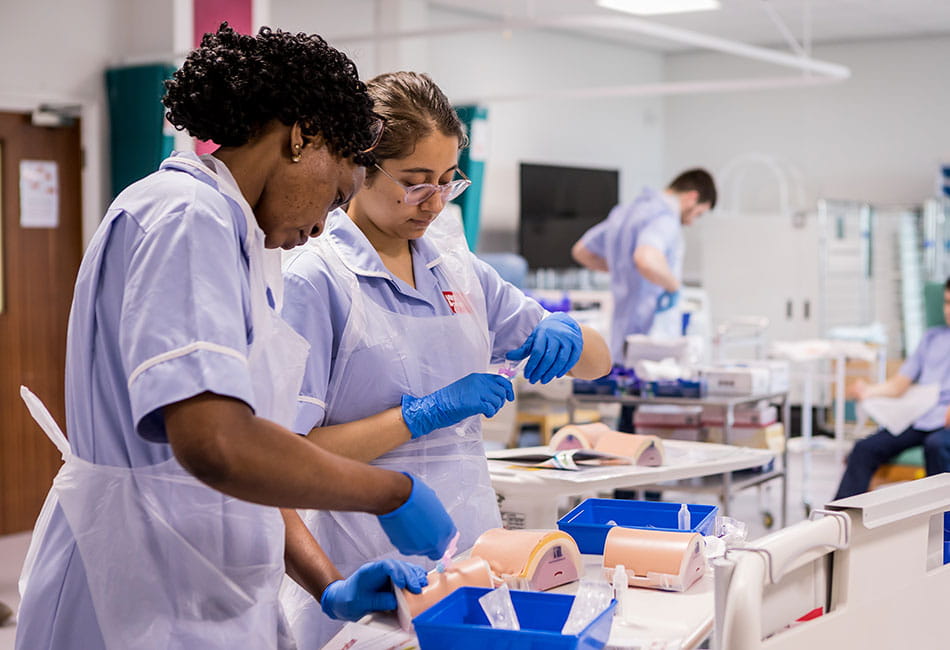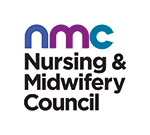
Higher/Degree Apprenticeship Nursing Associate (NMC 2018)
FdSc Nursing Associate
Page last updated 12 February 2024
Introduction
Study our Nursing Associate apprenticeship and you'll gain a Level 5 foundation degree to progress your career. This qualification will give you the eligibility to register as a nursing associate with the Nursing and Midwifery Council (NMC 2018).
Why study for a Nursing Associate (NMC 2018) apprenticeship?
This apprenticeship is for individuals employed in health and social care who are motivated to progress with their nursing role. Successful learners will achieve a level 5 qualification and be eligible to register with the Nursing and Midwifery Council (NMC) as a nursing associate.
Why UWE Bristol?
You'll be registered as a UWE Bristol student and get access to our extensive online and library resources. You'll be supported by the apprenticeship coordinators and programme team, and you'll receive help and guidance with developing study skills.
Our excellent links with clinical practice mean teaching is influenced by current thinking and best practice in the field. Our clinical partners also lend their expertise to periodic reviews of your progress throughout the apprenticeship.
Benefits to your employer
This apprenticeship will equip you with the wide-ranging skills you need to provide effective support to registered nurses in your workplace. For example, you'll develop your decision-making skills, leading to increased confidence and understanding of care delivery.
Through a combination of academic theory and work-based practice, you'll develop skills in all areas of nursing: from the initial assessment and planning of care, to its delivery and contribution to the interprofessional team. You'll be motivated and inspired by the opportunity to experience a variety of health and social care environments that cover the age spectrum.
You'll be equipped to carry out safe and effective practice, demonstrating appropriate values and behaviours in a range of health and social care settings. You'll also demonstrate personal responsibility while working under the supervision of the registered nurse, who'll benefit from greater flexibility to focus on their complex care duties.
An employer's guide to the deployment of qualified registered nursing associates in social care settings (PDF) is available from Skills for Care.
Careers
In addition to supporting your development in the workplace, this apprenticeship will help you to understand the career landscape in your sector and plan for your longer-term ambitions. Our award-winning Careers Service is on hand to give you independent advice and guidance at any point in your studies.
Course details
Content
Attendance at the University is a mixture of day release and two-block study weeks per academic year. Time away from the base area is also embedded within the curriculum and is arranged by the employer. This enables you to care for a range of patients and clients across the age spectrum and within a variety of settings.
Placements and supervisors are managed by the employer.
Year one
- Improving Safety and Quality
- Applied Anatomy and Physiology for Clinical Practice
- Communication and Relationship Management Skills
- The Accountable Professional in Clinical Practice 1
- Provide and Monitor Care.
Year two
- Contributing to Integrated Care
- The Accountable Professional in Clinical Practice 2
- Promoting Health and Preventing Ill Health
- Working in Teams
- Pharmacology and Medicines Management.
You'll also be supported to develop a learning portfolio.
Please note these modules are indicative and can vary.
Assessment
You'll be assessed throughout the apprenticeship both in practice and academically. To meet all styles of learning, there's a variety of forms of assessment, including exams, assignments and presentations.
Learn more about assessments.
Features
Professional accreditation
On successful completion of the apprenticeship, you'll achieve a FdSc Nursing Associate (Level 5) degree and be eligible to register with the Nursing and Midwifery Council (NMC) as a nursing associate.
Life
Health and Wellbeing
We provide support in the way you need it.
Bristol
A stunning city for student living with all the qualities to make you want to stay.
Sports, societies and activities
There is more to your experience here than study. Choose to make the most of it and try new things.
Sustainability
It is embedded in our culture, teaching and research.
Campus and facilities
Discover our campuses and the wealth of facilities provided for our students.
Entry
Typical offers
- Tariff points: 32
- GCSE: Grade C/4 or above in English and Mathematics or equivalent (we accept Functional Skills Level 2 in Maths and English).
- A-level subjects: No specific subjects required.
- EDEXCEL (BTEC) Diploma: No specific subjects required.
- Access: No specific subjects required.
- Baccalaureate IB: No specific subjects required.
- Irish Highers: No specific subjects required.
- T Levels: No specific subjects required.
Entry requirements
To be an apprentice, you must be employed in a role that's relevant to the skill, trade or occupation you're being trained for. As part of your commitment to the apprenticeship, you'll have to complete at least six hours per week of off-the-job learning activity within your normal contracted working hours, which is supported by your employer.
We use the UCAS Tariff system to make offers to applicants. You can use the UCAS Tariff Calculator to convert your qualifications and grades into points. You can also apply with an NVQ Level 3.
In addition, all applicants are required to complete:
- Disclosure and Barring Service (DBS) Check* - applicants are required to complete a Disclosure and Barring Service (DBS) enhanced check with UWE Bristol. Offers of a place will be subject to Disclosure of Criminal Background. The Rehabilitation of Offenders Act 1974 does not apply and all convictions, including those which are spent, must be disclosed. This is in accordance with the Rehabilitation of Offenders Act 1974 (Exceptions) Order 1975.
- Occupational Health* - you must be in good health and up-to-date with all routine immunisations that are required for working in health and social care settings. Employers will be required to share applicants' Occupational Health Clearance with UWE Bristol before you start your course.
*All information will be treated in confidence and only taken into account when absolutely necessary.
Accredited Learning and Accredited Experiential Learning
You may be able to gain accreditation for prior learning from another institution (Accredited Learning). Or you may be able to get credit for learning achieved through experience that may not be formally accredited (Accredited Experiential Learning). For more information, please see our Accredited Learning (AL) page.
Selection process
Applicants will be required to attend an interview.
ESFA eligibility requirements
To study an apprenticeship, you need to:
- be aged 16 years or over
- be an EEA citizen (with Right to Work in the UK) and not be in any other kind of full-time education (including being enrolled on any other apprenticeship programme)
- be employed (for at least the full planned duration of your apprenticeship) in a role that is linked to the appropriate industry for the apprenticeship training
- receive at least legal minimum wage for apprentices (wages vary depending on experience, employer and level or type of apprenticeship)
- commit to at least 6 hours per week of apprenticeship training during your normal working hours
- have support from your employer, including a mentor/line manager. Your employer is also responsible for funding your apprenticeship.
More information about eligibility for apprenticeship funding is available on the GOV.UK website.
Read more about entry requirements.
How to apply
Employed
If you’re interested in applying and have the support from your employer, speak to your line manager and/or HR team in the first instance for approval. Your employer will contact us so we can send you an application link.
Unemployed
If you’re not employed, you can use the following tools to find an apprenticeship vacancy with an employer:
- Employer’s careers page
- Find an Apprenticeship
- UCAS Apprenticeship search
For more guidance on higher and degree apprenticeship applications.
For further information
For course-specific enquiries, please contact the Programme Leader.
For all other enquiries, please email our Apprenticeship Hub apprenticeships@uwe.ac.uk or call +44 (0)117 32 84888.
For further information about Higher and Degree Apprenticeships.
